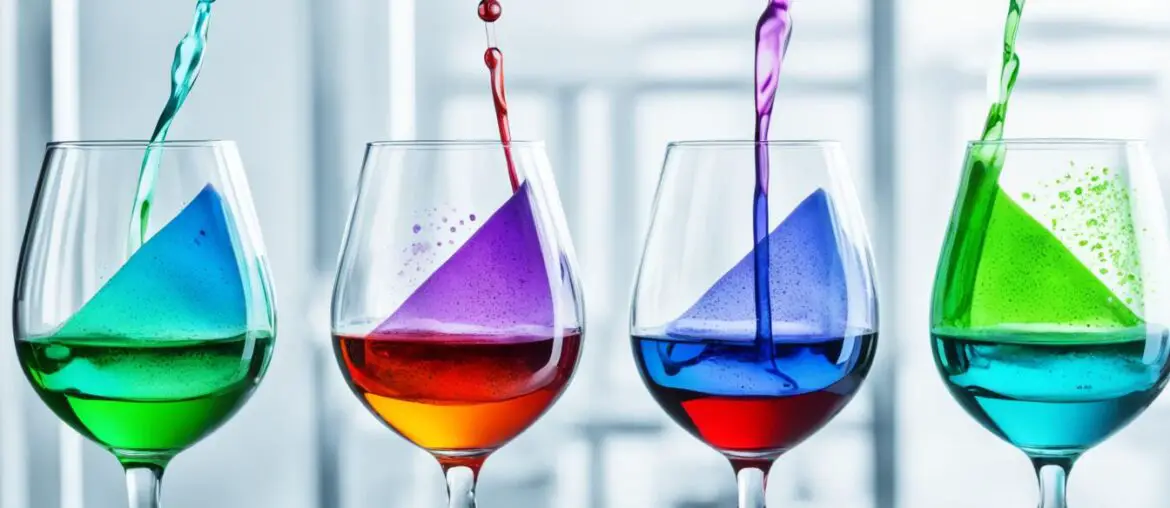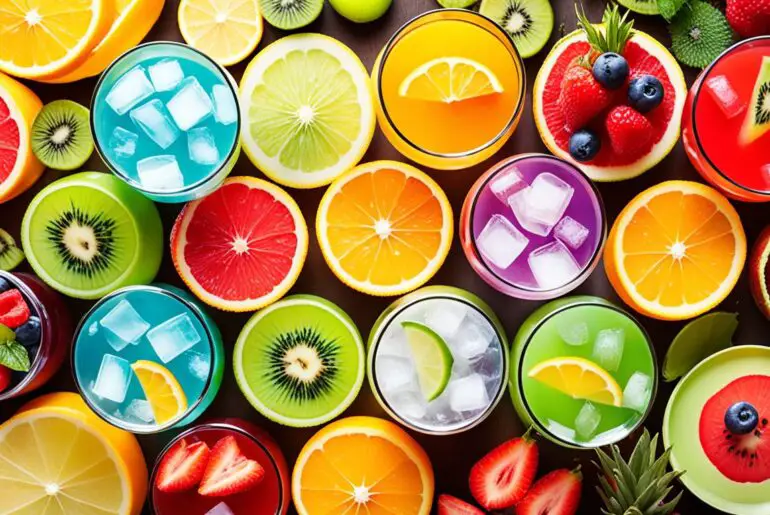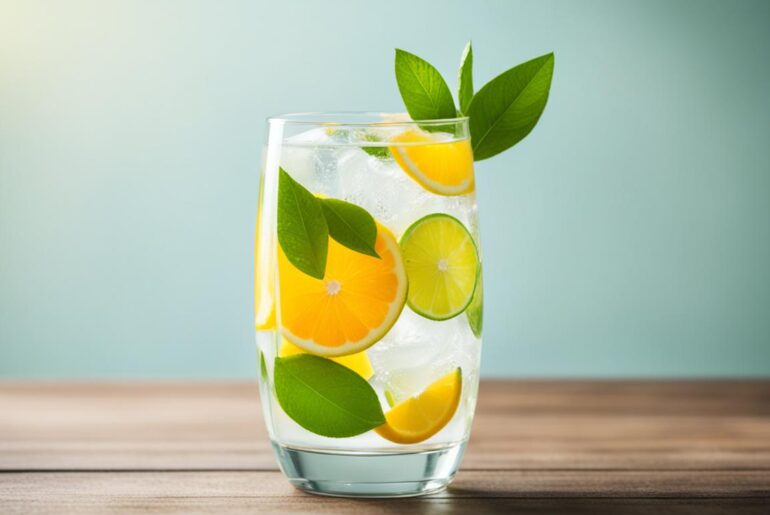Have you ever wondered how the HCG Diet affects your body’s ability to absorb alcohol? Does it make a difference if you’re on the diet or not? Prepare to be surprised as we explore the fascinating relationship between the HCG Diet and alcohol absorption rates.
Key Takeaways:
- The HCG Diet may impact alcohol absorption rates when mixed with artificially-sweetened beverages.
- Guidelines for responsible alcohol consumption should be followed while on the HCG Diet.
- Consider the potential effects of alcohol on weight loss goals and overall health while on the HCG Diet.
- Alcohol absorption rates can be influenced by factors such as food consumption and choice of drink mixers.
- The use of injections or sublingual drops for HCG administration is a personal choice based on preference and convenience.
The Impact of Artificially-Sweetened Mixers on Alcohol Absorption
Mixing alcohol with diet drinks, specifically artificially-sweetened beverages, can have a surprising effect on alcohol absorption in the body. Research has shown that when alcohol is consumed with a diet soft drink, it can result in elevated breath alcohol concentrations compared to mixing alcohol with a sugar-sweetened beverage.
This phenomenon was observed in both male and female social drinkers, suggesting that the effect is not limited to a specific gender. The use of artificially-sweetened mixers alters the rate at which the body absorbs alcohol, leading to higher breath alcohol concentration levels.
This finding has important implications for individuals who choose to consume diet drinks while enjoying alcoholic beverages. It is crucial to be aware of the potential impact on breath alcohol concentration and the body’s reaction to alcohol. Monitoring one’s alcohol consumption and understanding the influence of artificially-sweetened beverages can contribute to responsible drinking practices.
Furthermore, studies have indicated that altering alcohol absorption rates can also affect reaction times. This means that individuals consuming artificially-sweetened mixers may experience delays in their cognitive and motor abilities, potentially compromising their safety and well-being.
Considering the impact of artificially-sweetened mixers on alcohol absorption and reaction times, it is essential for individuals to make informed choices regarding their beverage selections. Being aware of the potential consequences of consuming diet drinks with alcoholic beverages is crucial for maintaining responsible drinking habits and ensuring personal safety.
Gender Differences in Alcohol Absorption on the HCG Diet
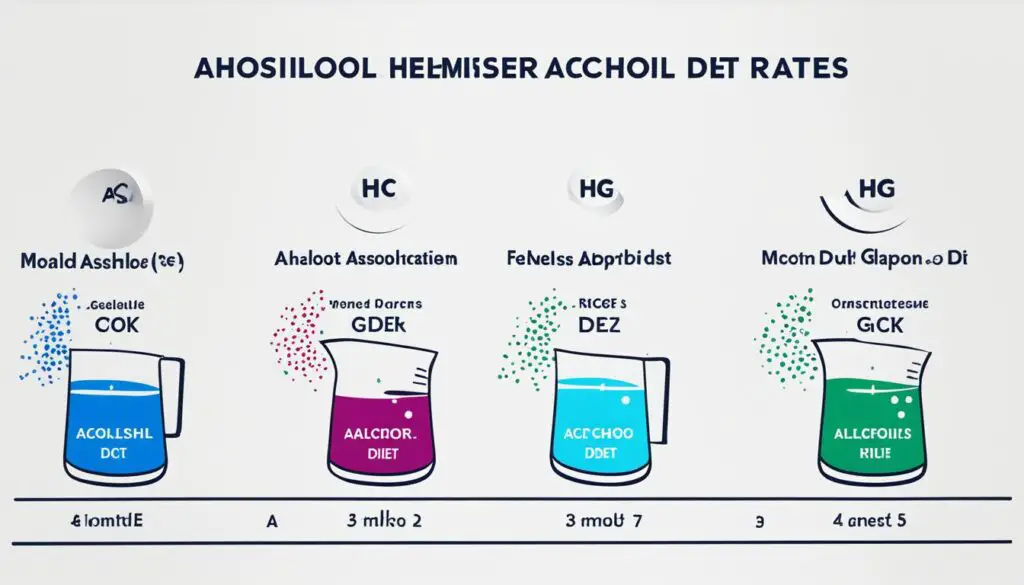
When it comes to alcohol absorption on the HCG Diet, gender may not play a significant role. A study conducted with participants in the HCG Diet found no significant gender differences in breath alcohol concentrations, objective performance measures, or subjective ratings. This suggests that both men and women on the HCG Diet may experience similar alcohol absorption rates.
Understanding the potential impact of gender differences is crucial, as alcohol consumption can affect individuals differently. However, on the HCG Diet, it seems that gender may not be a determining factor in alcohol absorption rates.
While gender differences in alcohol metabolism have been observed in other contexts, such as body composition and liver function, the study conducted on the HCG Diet did not find any pronounced differences in alcohol absorption based on gender.
This finding provides valuable insights for individuals following the HCG Diet. It suggests that men and women can both adhere to similar guidelines when it comes to alcohol consumption while on the diet. However, it’s important to note that responsible drinking habits should always be practiced, regardless of gender or dietary restrictions.
The Relationship Between Food and Alcohol Absorption
When it comes to alcohol consumption, the food we eat plays a vital role in how our bodies absorb and metabolize alcohol. Understanding the relationship between food consumption and alcohol absorption is important for making informed choices about drinking responsibly.
Consuming food before or during alcohol consumption can significantly impact alcohol absorption rates. When alcohol is consumed with food, the peak breath alcohol concentrations can be reduced by 20-57% compared to consuming alcohol on an empty stomach (alcohol absorption). This means that the effects of alcohol may be less pronounced when consumed alongside a meal. Stomach emptying is slowed down by the presence of food, which leads to a slower rate of alcohol absorption into the bloodstream.
Alcohol metabolism is also affected by food consumption. The presence of food in the stomach can delay the emptying of the stomach, thereby prolonging the time it takes for alcohol to be absorbed into the bloodstream. This slower absorption rate gives the body more time to metabolize alcohol, leading to a slower rise in blood alcohol concentration and potentially reducing the risk of alcohol-related impairment.
Non-alcoholic drink mixers, such as diet soft drinks, can also influence alcohol absorption rates. These mixers may alter stomach emptying rates and affect how quickly alcohol is absorbed (stomach emptying, alcohol absorption). It’s important to note that the impact of mixers can vary based on individual factors and the specific composition of the mixer.
The relationship between food consumption and alcohol absorption is complex and influenced by various factors, including the type and composition of the food, individual metabolism, and other individual-specific factors. It is essential to make responsible choices when it comes to alcohol consumption and consider the potential effects that food can have on alcohol absorption rates.
By being aware of the relationship between food consumption and alcohol absorption, individuals can make informed decisions about when and how much alcohol to consume. It’s important to remember that moderation is key and to always prioritize responsible drinking habits.
| Food Consumption | Alcohol Absorption | Stomach Emptying | Alcohol Metabolism |
|---|---|---|---|
| Consuming food before or during alcohol consumption | Can reduce peak breath alcohol concentrations by 20-57% | Slows down stomach emptying, leading to slower alcohol absorption | Provides more time for the body to metabolize alcohol |
| Non-alcoholic drink mixers, such as diet soft drinks | May alter alcohol absorption rates | Can affect stomach emptying rates | N/A |
HCG Diet Guidelines for Alcohol Consumption
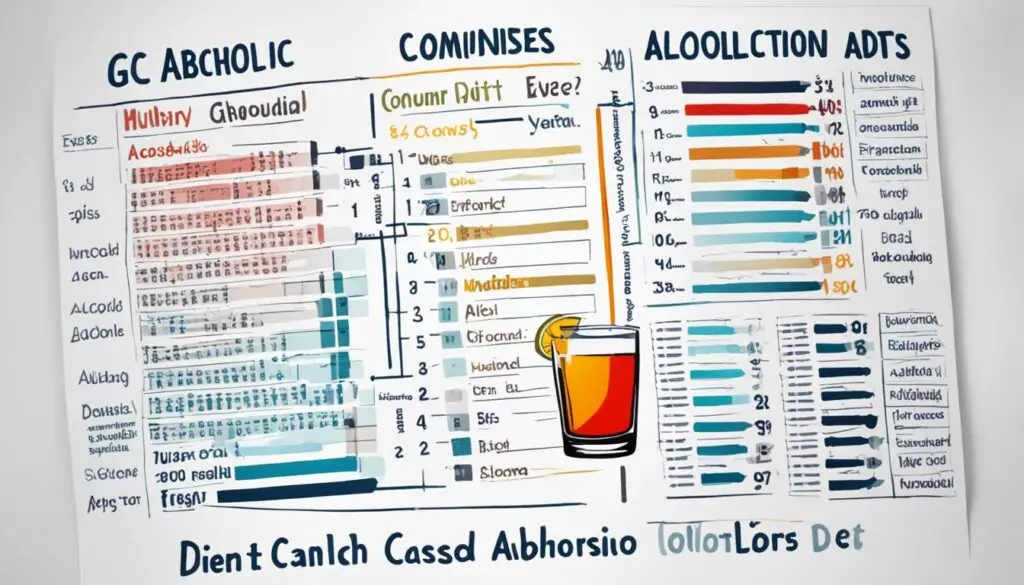
While following the HCG Diet, it is important to be mindful of your alcohol consumption. Although the original HCG diet protocol does not mention or account for alcohol intake, it is highly recommended to eliminate alcohol entirely while on the diet. This is primarily due to the high sugar content present in most alcoholic beverages, which can interfere with the desired outcomes of the diet.
Eliminating alcohol while on the HCG Diet is essential to ensure the safety and effectiveness of the diet. Alcohol consumption can sabotage weight loss efforts and potentially disrupt the delicate balance of the HCG hormone in your body.
It is advisable to adhere to responsible drinking guidelines even when you are not on the HCG Diet. Responsible drinking involves consuming alcohol in moderation and being mindful of its effects on your health and overall well-being. This includes taking into account factors such as your tolerance, any medications you may be taking, and any existing health conditions.
“Responsible drinking means knowing your limits, being aware of the potential risks, and making informed choices.”
By practicing responsible drinking habits, you can minimize the negative impact of alcohol on your body and maintain a healthy lifestyle. It is important to prioritize your health and wellness, especially when undertaking a diet like the HCG Diet that requires dedication and discipline.
HCG Diet Guidelines for Alcohol Consumption:
- Avoid consuming alcoholic beverages while on the HCG Diet.
- Choose non-alcoholic alternatives such as herbal teas, sparkling water, or mocktails.
- Stay hydrated by drinking plenty of water throughout the day.
- Be aware of the hidden sugars in mixed drinks and cocktails.
- Consult with your healthcare provider if you have any concerns or questions about alcohol consumption while on the HCG Diet.
| Alcohol Consumption | Effects on HCG Diet |
|---|---|
| High sugar content in alcoholic beverages | Interferes with weight loss goals |
| Disrupts the effectiveness of the HCG hormone | May hinder fat mobilization |
| Empty calories in alcohol | Negatively impacts overall calorie intake |
| Potential for overconsumption and poor food choices | May lead to increased calorie intake and hinder weight loss |
Choosing Between Injections and Sublingual Drops for HCG Administration
When it comes to administering HCG for the HCG Diet, individuals have the option to choose between injections and sublingual drops. Both methods have their own advantages and considerations to take into account.
Injections: The Authentic and Effective Method
Injections are widely considered to be the most authentic and effective method of delivering HCG into the system. Administered in low doses of typically 120-175 units per day, HCG injections offer precise and controlled dosage. The hormone is directly injected into the muscles, ensuring optimal absorption and effectiveness.
Sublingual Drops: Convenience and Ease of Use
On the other hand, sublingual drops provide a convenient alternative for those who may be uncomfortable with injections. The drops are placed under the tongue, where they are absorbed directly into the bloodstream. This method is known for its ease of use and eliminates the need for needles.
“Choosing between injections and sublingual drops ultimately comes down to individual preference and comfort level. While injections offer precise dosage control, sublingual drops provide a more convenient and needle-free option.”
It’s important to note that the effectiveness of HCG administration is dependent on consistent and proper usage, regardless of the chosen method. Consulting with a healthcare professional or certified HCG specialist can help individuals make an informed decision based on their specific needs and preferences.
Comparison of Injections and Sublingual Drops for HCG Administration
| Criteria | Injections | Sublingual Drops |
|---|---|---|
| Method | Direct injection into the muscles | Placement under the tongue for sublingual absorption |
| Dosage Control | Precise and controlled dosage | Drops provide pre-measured dosage |
| Convenience | Requires administration of injections | Simple and needle-free application |
| Comfort | May be uncomfortable for individuals with needle aversion | Does not involve needles |
The Role of HCG in Weight Loss
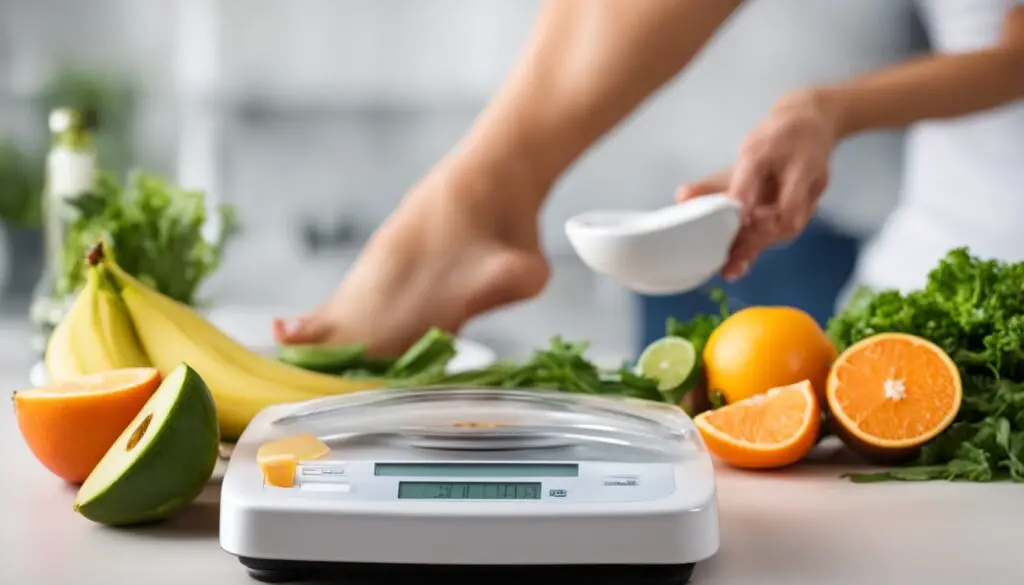
When it comes to weight loss, there are various approaches, including reducing calorie and fat intake. However, the use of Human Chorionic Gonadotropin (HCG) in combination with a low calorie diet can provide additional benefits. HCG helps mobilize excess fat for energy, allowing for the preferential elimination of accumulated fat.
By following a low calorie diet with the aid of HCG, individuals can achieve their weight loss goals more efficiently. HCG works by signaling the body to tap into its stored fat reserves, resulting in effective fat mobilization. This process helps individuals shed unwanted pounds without compromising bone density and muscle mass.
Through the HCG diet, users can experience the positive effects of fat mobilization while maintaining overall body composition. This is particularly beneficial for those seeking long-term weight loss and sustainable results. The combination of HCG and a low calorie diet offers a comprehensive approach to achieving and maintaining a healthy weight.
Moreover, the use of HCG does not negatively impact bone density. This is a concern for many individuals aiming to lose weight, as the loss of bone density can lead to various health issues. By preserving bone density, individuals can focus on shedding excess fat while maintaining optimal skeletal health.
Furthermore, HCG ensures that the body primarily targets fat stores rather than muscle mass during weight loss. This is crucial for preserving lean muscle, as muscle mass plays a key role in metabolic rate and overall physical function. By targeting fat for energy, HCG supports the preservation of muscle tissue, contributing to an effective and balanced weight loss journey.
Increased Fat Mobilization with HCG and a Low Calorie Diet
Choosing HCG as part of a weight loss journey allows for the preferential elimination of excess fat while maintaining bone density and muscle mass. This holistic approach provides a more effective and sustainable method for achieving weight loss goals.
By combining HCG with a low calorie diet, individuals can harness the power of fat mobilization without compromising their overall health. This approach ensures that weight loss primarily consists of excess fat, allowing individuals to achieve their desired body composition while maintaining bone density and muscle mass.
| Benefits of HCG in Weight Loss | How HCG Supports Weight Loss |
|---|---|
| Preferential elimination of excess fat | Signals the body to use stored fat for energy |
| Maintains bone density | Preserves skeletal health during weight loss |
| Preserves muscle mass | Targets fat stores while preserving lean muscle |
The Role of HCG in Sustainable Weight Loss
Potential Impact of HCG on Metabolism

When it comes to weight loss, the HCG diet has gained popularity for its potential to support effective and sustainable results. One common concern for individuals considering the HCG diet is whether it may slow down metabolism. However, research suggests that this is not the case.
The HCG hormone, when combined with a low calorie diet, actually works to signal the body to utilize stored fat for energy. This process, known as fat mobilization, helps reset the metabolism and prevents the body from entering starvation mode. By tapping into the body’s fat stores, the HCG diet promotes weight loss without compromising metabolism.
Unlike traditional low calorie diets that can cause the body to hold onto fat, the HCG diet encourages the release of excess fat and promotes a more efficient fat-burning process. This can lead to significant weight loss results while maintaining a healthy metabolic rate.
How does this work?
During the HCG diet, the hormone stimulates the hypothalamus to release stored fat. This fat is then used as the body’s primary source of energy, allowing individuals to burn fat while following a low calorie diet. The combination of HCG and a reduced caloric intake helps create a calorie deficit, which is essential for weight loss.
In addition to promoting fat mobilization, the HCG diet is designed to preserve lean muscle mass. This is important as muscle plays a crucial role in maintaining a healthy metabolism. Unlike other restrictive diets that may cause muscle loss, the HCG diet encourages the body to prioritize fat as a source of fuel while preserving muscle.
By supporting fat mobilization and preserving muscle mass, the HCG diet helps individuals achieve their weight loss goals while maintaining a healthy metabolism. It’s important to note that individual results may vary, and it’s always recommended to consult with a healthcare professional before starting any new diet or weight loss program.
HCG Diet for Men

Men looking to lose weight and improve their overall health can find success with the HCG diet. This diet has been proven to be safe and effective for men, helping them shed unwanted pounds and achieve their weight loss goals. But the benefits of the HCG diet for men go beyond just weight loss.
One significant advantage of the HCG diet for men is the potential to increase energy levels. HCG has been known to boost testosterone levels in men, which can lead to a significant increase in energy and stamina. This enhanced energy can make it easier for men to stick to their weight loss plan and stay active throughout the day.
Additionally, the HCG diet may have positive effects on fertility in men. By improving testosterone levels, HCG can potentially enhance fertility and increase the chances of conception for men trying to start a family.
It’s important to note that while men tend to lose weight efficiently on the HCG diet, the results may vary from person to person. Factors such as starting weight, body composition, and adherence to the diet guidelines can influence weight loss outcomes.
Testimonial from a Successful Male Participant
“The HCG diet was a game-changer for me. Not only did I lose weight and reach my goal, but I also had so much more energy throughout the day. It helped me stay focused, motivated, and ready to take on any challenge. I highly recommend it to any man looking to transform their physique and improve their overall well-being.”
To learn more about how the HCG diet can benefit men, consult with a healthcare professional or licensed HCG provider. They can provide personalized guidance and recommendations based on individual health needs and goals.
Next, we will explore the concluding thoughts on the impact of the HCG diet on alcohol absorption rates and responsible consumption.
Conclusion
Throughout the HCG Diet, it’s crucial to be mindful of alcohol consumption and its potential impact on weight loss goals. The combination of the diet and artificially-sweetened beverages can affect alcohol absorption rates, leading to higher breath alcohol concentrations.
To maintain responsible consumption, it’s recommended to follow guidelines that eliminate alcohol while on the HCG Diet. This is especially important due to the high sugar content in alcoholic beverages, which can hinder the effectiveness of the diet.
Considering the potential effects of alcohol on overall health and weight loss, responsible consumption on the HCG Diet is essential. By prioritizing responsible drinking and adhering to guidelines, individuals on the HCG Diet can optimize their chances of achieving their desired results.
FAQ
How does the HCG Diet affect alcohol absorption rates?
Limited research suggests that alcohol consumed with an artificially sweetened mixer results in higher breath alcohol concentrations compared to the same amount of alcohol consumed with a similar beverage containing sugar. The use of artificially-sweetened mixers alters alcohol absorption rates.
Is there a difference in alcohol absorption rates between males and females on the HCG Diet?
No gender differences were observed in breath alcohol concentrations, objective performance measures, or subjective ratings in a study conducted with participants on the HCG Diet. This suggests that gender may not play a significant role in alcohol absorption rates while on the diet.
Does consuming food affect alcohol absorption rates?
Consumption of food can significantly influence alcohol absorption rates. When consumed with food, peak breath alcohol concentrations can be reduced by 20-57% compared to alcohol consumed alone.
Are there guidelines for alcohol consumption on the HCG Diet?
While the original HCG diet protocol does not mention or account for alcohol consumption, it is recommended to eliminate alcohol while on the HCG Diet due to the high sugar content in alcoholic beverages. Responsible drinking guidelines should be followed to ensure the safety and effectiveness of the diet.
What is the recommended method of administering HCG for the HCG Diet?
HCG for the HCG Diet is available in both injections and sublingual drops. Injections are considered the most authentic and effective method of delivering HCG into the system. The injections are administered in low doses, typically 120-175 units per day.
How does HCG contribute to weight loss on the HCG Diet?
While it is possible to lose weight by simply reducing calorie and fat intake, the use of HCG in conjunction with a low-calorie diet helps mobilize excess fat for energy. This allows for preferential elimination of excess fat without affecting bone density and muscle mass.
Does the HCG Diet slow down metabolism?
The HCG diet, when combined with a low-calorie diet, does not slow down metabolism. In fact, the hormone signals the body to use stored fat for energy and helps reset the metabolism. This prevents the body from going into starvation mode and holding onto fat.
Is the HCG Diet safe and effective for men?
The HCG diet is safe and effective for men. HCG has been known to boost testosterone levels, leading to increased energy and fertility. Men tend to lose weight efficiently on this diet.
Can the HCG Diet impact alcohol absorption rates?
The HCG Diet may impact alcohol absorption rates when mixed with artificially-sweetened beverages. It is important to follow responsible guidelines for alcohol consumption while on the diet. Consideration should be given to the potential effects of alcohol on weight loss goals and overall health.

